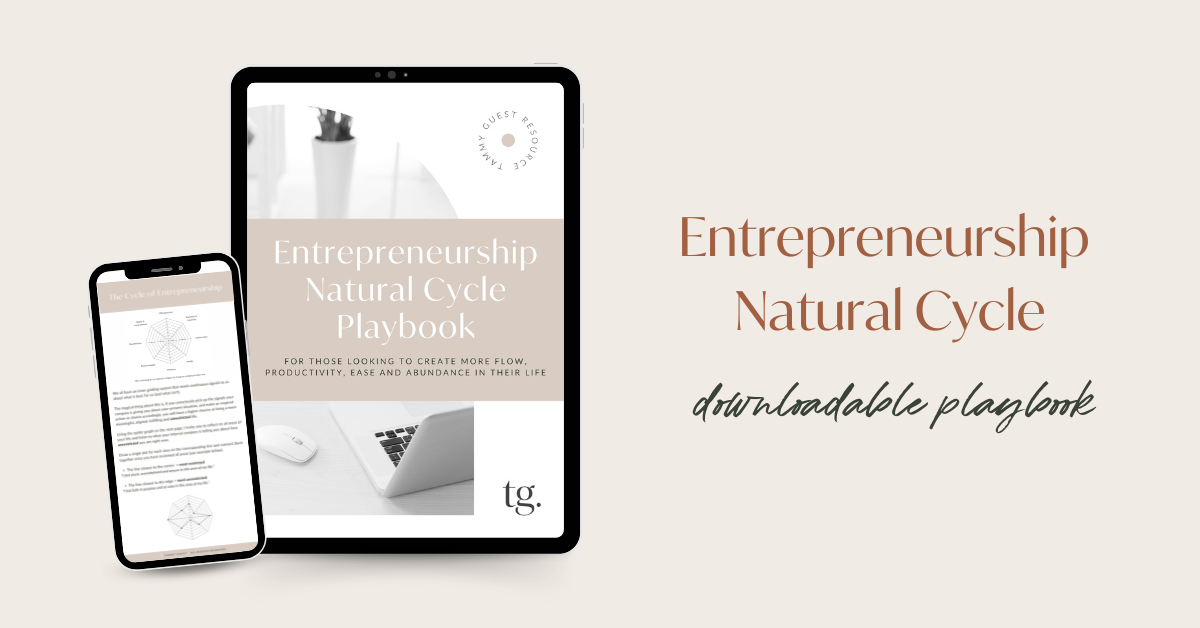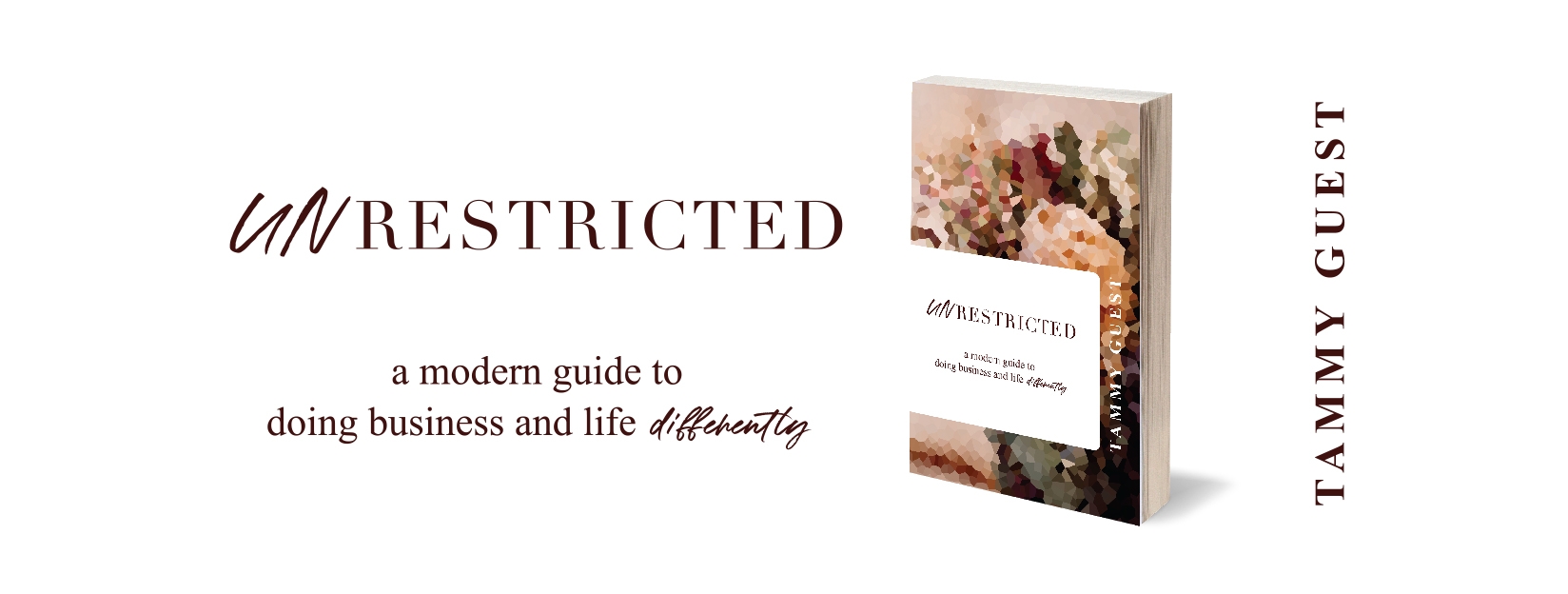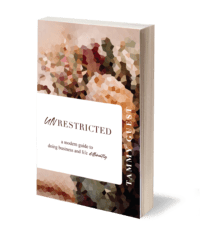In part one of this Mindset series, I covered some important strategies to setting up your business to make money. Today, we’re going to dive into money mindset for practitioners. Because you can try all the strategies in the world but if your mindset is blocking you, it makes everything really hard.
Stories vs Facts
In one of my other posts, I talk about the stories we tell ourselves vs facts. And this definitely comes into play again when we’re talking about money.
The actual facts of things are often very different from the story we attach to it. And whether that story is helpful or hindering, or expansive or contractive, it’s still a story.
So when we:
- have conversations around money
- price things for either online or offline
- set prices for your different kinds of offerings
- start working in a new way
There will be conscious or unconscious stories that pop up. And they aren’t FACTS, they are stories that cloud what’s underneath.
So, before we can properly price things or do other money activities, we need to really explore how we feel about money.
Ideally, we want to set a price that’s going to be:
- logical
- helpful
- heartful
- grateful
and will help you create the ideal life and business you want. Taking time to get your mind right around money is how you will get there.
Money Mindset Blocks
When I first started in practice, one of the amazing moments – as well as one of the devastating, shameful memories – was finally getting a couple of clients. But every single time I went to put a client’s card through the terminal at the end of their consultation, I would enter the price I didn’t have enough guts to publish on my website (which is illegal, by the way) and give them a sale discount.
Every. Single. Time. I couldn’t bring myself to charge what I had said was my consultation price.
Have you ever been in that situation? All of a sudden you’re giving 10% off today or just rounding it down? Or go WAY over the set appointment time but still keep the same price?
The reality is that whenever you create something to sell, whether offline or online, the facts are that:
- you created this value
- which costs this much money
Those are the facts. But a whole bunch of stuff around the facts makes things a bit murky.
So when we do things like those we just described, they don’t come from the logic of setting a price and taking money for it. They come from a mindset. And that mindset comes from stories we have around money that we have built up throughout our lives.
Exploring Money Mindset Stories
Now, the first time I learned about working through money mindset blocks, my logical, scientific brain just rejected it. I thought it was ridiculous and I wasn’t going to do it. You might feel that way too, and that’s okay.
But I invite you to explore where your money stories come from. Because they have created neural pathways in your brain and one of the ways you process this programming is to short yourself when someone tries to give you money.
Where Does Value Come From?
My mom, bless her, used to only buy things on sale. She would come home and describe being at the shops and buying that thing on sale. And the cheaper it was, the better. The more value it had to her.
I don’t know if this is a story you can relate to, but there’ll be something similar that’s happened in your life that skews your sense of value. Maybe it’s something like:
- something on sale is worth more
- there’s more value in things you’ve worked really hard for
- things that are easy aren’t worth much
- inherent value is found in certain things
Because the stories you’re carrying around came from somewhere. One of my big ones came from ‘there is more value in something on sale than when you pay full price.’
So when it came time to charge my clients, I would always say my consultation was on sale that day. That made me feel like there was more value in what I gave.
Working Hard
Another story I developed because of my background was around my dad, who was in the Air Force and worked really hard. I would see him marching around the bases that we lived on. Plus, he travelled for work and worked ridiculous hours from 6:00 in the morning until 6:00 at night. He was often away for different exercises they did all over the world.
So the story I got from that was, ‘I work hard for my money. Don’t frivolously spend it.’ I took that on board as my work ethic. I work really hard for my money.
Hearing this, you might think, “Well, of course, you do.” But that’s not a fact, it’s a story that we are collectively generating. Because I’ve actually had times where I made money without working hard.
And once I explored this story, I realised money could come really easy to me. If I just create this webinar and people buy it, what’s going to happen? But to get there, I had to get past my feelings that working hard for money is more valuable than making money easily.
The Story
When I was in cancer research in pathology, I worked really hard. But I didn’t work as hard as, say, the tradesmen who were outside in the heat or that kind of thing. So I started to feel guilty about that.
Consequently, I worked even harder. I was there at 11:00 at night sometimes, taking off cell cultures, working in horrible laboratory environments, and so on.
Then, when I started my own practice, all I had to do was sit in front of somebody and share my knowledge with them. I literally just had to sit there and tell them all the things that were already in my head.
And I thought – I didn’t work very hard. So I thought there wasn’t any inherent value in what I did because I didn’t work hard for it.
The Facts
But let’s look at the facts. That thinking didn’t take into account the 10 years of post-high school education or the insane amount of money it cost to get those multiple degrees. All of THAT working hard was not taken into account.
So the moment when I was with that client, I was basing my value on stories I had developed over my whole life.
But the FACT of it was very different from the story I had created.
Exploring Your Money Stories
So what I did was write down all of the stories I had around money. I wrote down stories like:
- when I felt full of shame because my card was declined at the supermarket when I was a student
- not being able to withdraw money from an ATM because I didn’t have enough money in the account, and the shame that caused
- that money runs out
- money is hard to get
- if I can’t afford it, my clients can’t afford it either
There were many other moments in my life that I had to write down and consider if it was affecting the way I showed up in life and in my business.
Here’s a really big story that once I got past it, changed everything for me.
“If I personally can’t afford it, I assume my clients can’t afford it either.”
Understanding that I had this idea in my head truthfully changed everything for me. And I only got that insight because I explored all of my other stories around money as well.
Because that one thought was part of all the others – when I couldn’t pay for my groceries, when I couldn’t get money out of the ATM – those were all “I can’t afford it” moments.
And every time it happened, it was reinforcing that same story in my neural pathways. So of course, I then projected it on to everybody else.
Don’t Project Your Own Stories Onto Others
One thing you must remember is that we are only in charge of our own mindset. We’re not in charge of anybody else’s mindset or how they spend their money.
So when we believe, “my client can’t afford it because I can’t afford it” – we’re projecting our own stories onto others.
Think of it this way. What would happen if you actually said that out loud to a client? If you told your client, “I believe you can’t afford it,” how would that make them feel?
Well, I know if someone said that to me, I would be horrified!
So before we go around making assumptions about other peoples’ money situations, we need to first:
- acknowledge and notice our own stories
- take time to do the work on our own minds
And then everything that we do outside of that, we just offer it to someone else and let them make up their own minds about whether they can afford it or not.
Value Is Different For Everyone
Another thing in this area is around the value we create for our clients. The services or products you provide may not feel like a lot of value to you, but for someone else, it might be invaluable.
For instance, for them to be able to:
- go on a fertility journey with you
- get taught about their preconception care
- learn about their labour
- connect with the community
- be coached about post-care follow-up
Those things are invaluable. Maybe we don’t find inherent value in it, but we can’t say how much value is there for someone else.
So don’t project your own value and money stories onto others. Let people decide for themselves what is valuable and whether they can afford it or not.
Assuming doesn’t help you, it doesn’t help them, and it definitely doesn’t help your business.
Work On Your Money Mindset Before Setting Prices
Pricing is something that most practitioners struggle with. Partly because of our own money stories but also because of OTHER people’s money stories.
For instance, I know practitioners who have spoken to doctors about getting referrals and were told that clients would be unlikely to pay the money. But the fact is that they pay money to see the doctor privately for 10 minutes and a consultation with you might be a full hour.
So what you’re seeing there is the doctor’s money story coming out.
That’s why it’s important to work through your own money stories before you start working on pricing. Get clear on what assumptions, blocks, and stories are holding you back. And learn to see your own value before you start looking at other people’s pricing or working on your own.
And remember that asking other people for their perceptions of what you should charge is only going to show you where their money blocks are.
A Powerful Exercise To Release Your Stories
You might resonate with this exercise or you might not. But I know from the experience of taking hundreds of practitioners through this that it can be truly powerful.
Start by writing down as many money stories as you can. Identify:
- moments where you have felt uncomfortable or ashamed about money
- things that you heard when you growing up from your family and friends
- articles you’ve read or things you’ve heard about the uncertainty of being in business
- where you’ve heard that practitioners can’t make money
- any other ideas or memories you have around money and value that make you feel uncertain, uncomfortable, or not enough
Then explore each one of those stories. Ask yourself:
- Where did it come from?
- Who said it?
- When did they say it?
- What was their situation like at the time?
- Was it a fact or their story when they said it?
- Is there a part of it you can accept?
- Which parts can you release?
- Were they truly trying to be helpful at the time but possibly coming from a different space than you are in?
The experience that goes with this is an exploration of four easy statements to ensure you’ve really explored where the story comes from and let it go.
It Starts With Forgiveness
This process is just for you. You don’t need to do any of these things with anyone else.
This process starts with forgiveness. First, thank the experience for happening as well as whoever was associated with it. Apologise for your role in it, how you took it on board, and how it may have changed things.
Most importantly, forgive whoever needs forgiveness – including yourself – around it. And send love to everyone involved.
Write a Letter Of Forgiveness (If Needed)
Lastly, if things feel a bit niggly and you still feel funny about it, try writing a forgiveness letter. That’s exactly what I had to do.
To be clear, I’m not suggesting you send these letters to anybody. They are just to help you.
But when it came to my mum, I had to get it out of my head and out of my system. So I wrote a forgiveness letter particularly around my mum as a home keeper. She was a stay-at-home mom for my entire school life and the story I created around that was that women work for free.
It was heavy. So when I began caregiving as a natural health practitioner, I had a hidden story in the background that because I was a woman, I should be caregiving for free. So every time I went to receive a payment, that underlying idea – even apart from the other stories – told me I should be doing it for free.
And I know this idea affects a whole realm of healers.
It was one of the stickiest ones. So to work through it, I wrote a forgiveness letter about myself, what I believed to be the reasons my mom did that, and I wrote it to the timing of our lives and her choices.
Take Action
Again, this may not be for everyone. But I’ve seen so much good come out of it that had to share it with you.
You might see the logic enough to give it a go.
But my invitation to you is to actually write down as many stories as you can and move through each of those stories to:
- understand them deeper
- let go of them
- forgive them
- and move forward
Because it’s going to make pricing, all of your money related activities, and being in business so much easier.










Leave A Comment